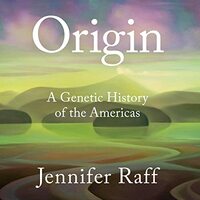You need to sign in or sign up before continuing.
Take a photo of a barcode or cover
informative
reflective
medium-paced
A very comprehensive overview of the different theories of how people migrated into North and South America thousands of years ago plus a look at how previous research and studies have harmed Native peoples. I wish people weren’t horrible human beings but I hope researchers like the author and the other geneticists she mentions can go forward with their research and respect the wishes of the communities they’re studying.
challenging
hopeful
informative
inspiring
reflective
medium-paced
informative
inspiring
slow-paced
well explained and definitely focused on being respectful to and about indigenous histories. i appreciated the author, a self-described "anthropological geneticist", using so much cultural and biological anthro theory thru this in a way that is accessible without being alienating for non science and non anthro folks. there were moments that were repetitive but overall the prevalent theme of respect for present day peoples in relation to the ancient people who were subjects of study was a delicate balance and achieved well.
While genetic studies can shed light on our history, they can also be used in problematic ways. A thought provoking discussion about current paleogenetic research that includes important discussion about building relationships with community stakeholders, consent, and scientific racism.
A review of current genetic-based understanding of the first people's colonization of North America. It includes an overview of the author's preferred interpretations and a brief summary of other possible interpretations. A nice quick guide to current anthropological understanding.
Read it alongside https://www.goodreads.com/book/show/264289.After_the_Ice_Age and https://www.goodreads.com/en/book/show/37941599 to get a nice picture of prehistory.
Read it alongside https://www.goodreads.com/book/show/264289.After_the_Ice_Age and https://www.goodreads.com/en/book/show/37941599 to get a nice picture of prehistory.
Jennifer Raff writes in accessible terms about the genetic history, archeology, and theory surrounding the Americas first people. She also writes and advocates for the understanding and practice of all of the people uncovered, written about, and tested to be treated with respect and sanctity (even if the person is from an era we know little about and separated by thousands of years). I learned a lot in this book and highly recommend it for anyone interested in the history of the Americas.
This was a well done analysis of what is known about the movement of people across the Behring Strait into North and South America. The author examines available information from anthropology and the more recent DNA studies of ancient remains. She is sensitive to the concerns of Native Americans and works with them to advance scientific knowledge. A good read and highly recommended. It is somewhat technical, but the author strives to write so anyone with a basic scientific knowledge and understand.
You may find this a slightly frustrating book, because it does not give you "the answers." In fact, Raff says, in a decade it may be obsolete. This is not to fault the book, however, it is to its credit. Raff probably goes overboard in saying "I find this likely, but other disagree."
I found the book a quick read, and very informative. She spent a little less time than I had hoped on the possibility of Pacific Islander travel to S. America and she's (understandably) reluctant to simplify things into a graph showing who moved where when, though I think would still be helpful to visualize things. Combining this book with "The Dawn of Everything" paints a very different picture of indigenous America (both North and South) than we were told in school.
I found the book a quick read, and very informative. She spent a little less time than I had hoped on the possibility of Pacific Islander travel to S. America and she's (understandably) reluctant to simplify things into a graph showing who moved where when, though I think would still be helpful to visualize things. Combining this book with "The Dawn of Everything" paints a very different picture of indigenous America (both North and South) than we were told in school.
informative
reflective
medium-paced

